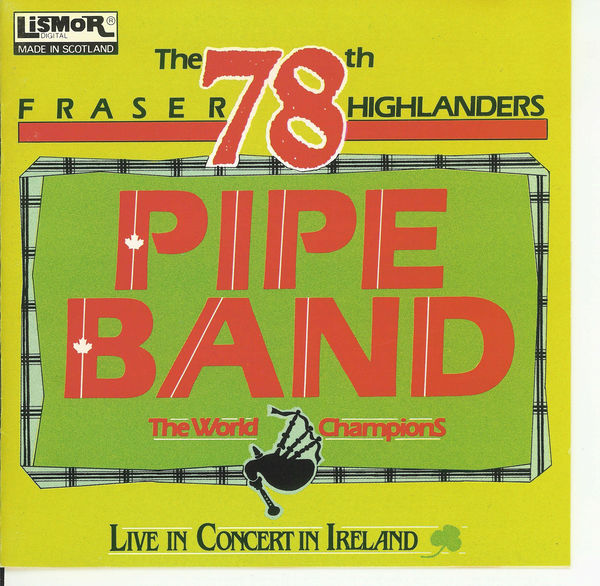Covered classics
 I like k.d. lang’s version of “Hallelujah” the best. There’s Jeff Buckley’s, and I recently heard a great rendition by Francesco Yates, and of course there’s Leonard Cohen’s original, but, for me, it’s got to be k.d.
I like k.d. lang’s version of “Hallelujah” the best. There’s Jeff Buckley’s, and I recently heard a great rendition by Francesco Yates, and of course there’s Leonard Cohen’s original, but, for me, it’s got to be k.d.
To riff on U2, it’s even better than the real thing.
The upcoming “Live In Ireland 87 In Scotland” concert got me thinking about the pipe band habit of being original, at least when it comes to medleys and concert material. Pipe bands of course play the same 2/4 marches, strathspeys and reels for set events as a matter of course, but have pipe bands ever – in competition or not – “covered” another pipe band’s work? I can’t think of an instance.
Sure, bands will take single tunes introduced by other bands and put their own spin on them, at least with a new percussion score, but entire medleys or suites first brought out by another pipe band? Never.
Even the reunion of players and some extra-special friends from the 1987 78th Fraser Highlanders’ concert in Ballymena, Northern Ireland, won’t be truly covering material, since you can’t cover music that you came out with originally.
But, it seems to me, it’s high time that pipe bands started to break down that unwritten rule that they can’t play creative material done by other bands. I would think it’s the next big step or trend for pipe bands: make a classic medley of the past new and exciting once again with a new arrangement with different harmonies, bridges, even subtle time signature and tempo tweaks to celebrate it again by, to use the American Idol cliché, “make it their own.”
To revisit the jazz composer Don Thompson’s “Journey To Skye” by the same group that did it first is fine, but I’d love to hear, say, Inveraray & District make it perhaps even better, with different harmonies and tempos, with a modern bass section arrangement. Or how about the medley that Victoria Police used to win the 1998 World’s updated and reinterpreted by, say, St. Laurence O’Toole? Or a 1980s Vale of Atholl concert suite done by Field Marshal Montgomery? Or go way back and take a selection from the 1960s Invergordon Distillery (“Old Woman’s Lullaby,” anyone?) and give it a modern makeover.
Or could a Grade 3 band of today take on the “Detroit Highlanders” Strathclyde Police medley of the 1980s? Why not? It’s excellent fundamental music that is eminently within the grasp of many modern mid-grade bands. It’s not sacred and untouchable; it’s music that deserves to be appreciated again in a new way.
I have heard people wonder often why some pipe band suite or other isn’t heard again. “If ‘The Megantic Outlaw’ was any good, then why do we never hear it today?” is a thought I’ve listened to not a few times. Whatever your personal opinion of that or any other piece of music associated closely with a particular pipe band, the reason their music isn’t heard again is simple: there’s an unwritten code that pipe bands don’t do that, that they always have to be 100 per cent original.
To be sure, it’s fun and challenging for a pipe band to create whole new medleys, but it doesn’t have to always be this way. There’s tons of room to be original with existing content, to resurrect well-kent classics, to make them your own.
In fact, if I were a band hoping to be noticed, or step up in the ranks, I would take a cue from budding pop stars. More often than not, they get noticed by doing a great cover of a well-known song. They eliminate the burden of having to rise up with their own material, knowing that songwriting can come, after they are discovered via their covers. Originality can come in many forms.
k.d. lang’s version of “Hallelujah” does not diminish Leonard Cohen’s song one iota. She celebrates and honours it, just as Jeff Buckley did, putting a personal and fresh complexion on it, bringing it to another generation, and Francesco Yates does it again.
It’s all good, and it’s all possibly even better.




 Social media has profoundly impacted the piping and drumming world. I
Social media has profoundly impacted the piping and drumming world. I 
 The recent
The recent 
 The season’s over in the northern hemisphere. The World Championships and regional events are done and dusted. Pipe bands will take a break for a month or two, recharge the tuning metre, dry out the kitty litter, loosen the lugs, and give the fingers and wrists a rest.
The season’s over in the northern hemisphere. The World Championships and regional events are done and dusted. Pipe bands will take a break for a month or two, recharge the tuning metre, dry out the kitty litter, loosen the lugs, and give the fingers and wrists a rest.


 I’m a moderate fan of
I’m a moderate fan of 

 Social media is a melting pot for piping and drumming. Twenty years ago, unless you played in a band with someone, or hung out with them in solo circles, or maybe went to a piping and drumming summer school, you’d hardly know anything substantial about anyone.
Social media is a melting pot for piping and drumming. Twenty years ago, unless you played in a band with someone, or hung out with them in solo circles, or maybe went to a piping and drumming summer school, you’d hardly know anything substantial about anyone.


 Pressuring bands to compete only in sanctioned contests makes some sense. The RSPBA’s most recent alleged request – some use the word “bullying” – that
Pressuring bands to compete only in sanctioned contests makes some sense. The RSPBA’s most recent alleged request – some use the word “bullying” – that  The grand old Crieff Highland Games deciding, at least this year, to drop solo piping competitions from its day in August is certainly a shame for piping tradition, but it’s emblematic of the challenges facing event organizers — and us.
The grand old Crieff Highland Games deciding, at least this year, to drop solo piping competitions from its day in August is certainly a shame for piping tradition, but it’s emblematic of the challenges facing event organizers — and us.


 Why are pipe sections so big? It’s the great question of this particular era of pipers and drummers, and there’s no sign of the issue going away any time soon. It’s a quandary that virtually every competing band in every grade faces.
Why are pipe sections so big? It’s the great question of this particular era of pipers and drummers, and there’s no sign of the issue going away any time soon. It’s a quandary that virtually every competing band in every grade faces. Pipe bands and solo pipers are generally reluctant to introduce unfamiliar tunes into their competition repertoire. It’s usually regarded as an unnecessary risk to unveil a medley of all, or even half, newly minted, previously unheard content. When it comes to MSRs, those of us who have been around a few years have heard “The Clan MacRae Society,” “Blair Drummond” and “Mrs. MacPherson” ten-thousand times.
Pipe bands and solo pipers are generally reluctant to introduce unfamiliar tunes into their competition repertoire. It’s usually regarded as an unnecessary risk to unveil a medley of all, or even half, newly minted, previously unheard content. When it comes to MSRs, those of us who have been around a few years have heard “The Clan MacRae Society,” “Blair Drummond” and “Mrs. MacPherson” ten-thousand times. This year marks the fortieth anniversary of the Great Tape Scandal of Inverness. In 1974, Bill Livingstone’s second-prize in the Highland Society of London’s Gold Medal was rescinded after Lezlie Webster (nee Patterson) produced a tape recording of his tune, conclusively proving that Livingstone “went wrong” in his performance.
This year marks the fortieth anniversary of the Great Tape Scandal of Inverness. In 1974, Bill Livingstone’s second-prize in the Highland Society of London’s Gold Medal was rescinded after Lezlie Webster (nee Patterson) produced a tape recording of his tune, conclusively proving that Livingstone “went wrong” in his performance.
 I am proud to play a pipe.
I am proud to play a pipe.




 The debacle that the RSPBA created by taking upon itself to
The debacle that the RSPBA created by taking upon itself to ![Musical Edge [photo: Y2kcrazyjoker4 - Creative Commons] Musical Edge [photo: Y2kcrazyjoker4 - Creative Commons]](https://www.pipesdrums.com/storage/2014/05/Edge.jpg) It’s generally a bad sign when someone comments that you or your band had a very “musical” performance. In piping-speak it’s a backhanded compliment that really means that the technique and tone weren’t so great, but they managed to listen through it to discern that you actually know how to deliver the tunes.
It’s generally a bad sign when someone comments that you or your band had a very “musical” performance. In piping-speak it’s a backhanded compliment that really means that the technique and tone weren’t so great, but they managed to listen through it to discern that you actually know how to deliver the tunes.
 My first real introduction to the Masons was in 1983 and I didn’t even know it. A naive 19-year-old American piper at the Argyllshire Gathering, I thought that Andrew MacNeill of Colonsay simply had a strange handshake. When I was introduced to him and shook his hand, he sort of tickled my palm. I didn’t think much of it, but when I saw him the next day and he spat on his hand before shaking mine, I thought it a bit queer.
My first real introduction to the Masons was in 1983 and I didn’t even know it. A naive 19-year-old American piper at the Argyllshire Gathering, I thought that Andrew MacNeill of Colonsay simply had a strange handshake. When I was introduced to him and shook his hand, he sort of tickled my palm. I didn’t think much of it, but when I saw him the next day and he spat on his hand before shaking mine, I thought it a bit queer.

